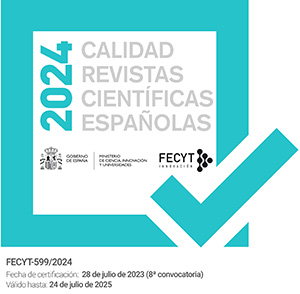Comparación de productos de área quemada obtenidos mediante imágenes de satélite en la península Ibérca
DOI:
https://doi.org/10.5944/etfvi.1.2008.1458Keywords:
productos de área quemada globales, teledetección, validación, Península Ibérica, global burnt area products, remote sensing, validation, Iberian Peninsula,Abstract
La teledetección se ha convertido en una herramienta de gran interés en la cartografia de las áreas afectadas por los incendios forestales, especialmente a escalas regionales y globales debido a las ventajas que proporcionan las imágenes de satélite. Los sensores espaciales observan sistemáticamente la superficie terrestre en condiciones homogéneas y a diversas escalas espaciales dependiendo de las características del sensor. Además recogen información con una frecuencia temporal adecuada a las características dinámicas del fenómeno y en regiones espectrales que facilitan la identificación de las superficies afectadas e incluso la severidad del incendio.
Remote Sensing has become a tool of great interest for the mapping of areas affected by forest fires, especially on a regional and global scale due to the advantages provided by the satellite images. Spatial sensors monitor the ground systematically and in homogeneous conditions, to various scales depending on the characteristics of the sensor. Also they gather information on a temporal frequency that is appropriate for the dynamic characteristics of the phenomenon and in spectral regions that ease the identification of the areas affected and even the severity of the fire.
Downloads
Downloads
Published
How to Cite
Issue
Section
License
Authors who publish in this journal agree to the following terms:
- Authors retain copyright and grant the journal right of the first publication with the work simultaneously licensed under a license Creative Commons Reconocimiento-NoComercial 4.0 Internacional that allows others to share the work with an acknowledgement of the work's authorship and initial publication in this journal.

- Authors are able to enter into separate, additional contractual arrangements for the non-exclusive distribution of the journal's published version of the work (e.g., post it to an institutional repository or publish it in a book), with an acknowledgement of its initial publication in this journal.
- Authors are permitted and encouraged to post their work online (e.g., in institutional repositories or on their website) prior to and during the submission process, as it can lead to productive exchanges, as well as to earlier and greater citation of the published work (See The Effect of Open Access).







